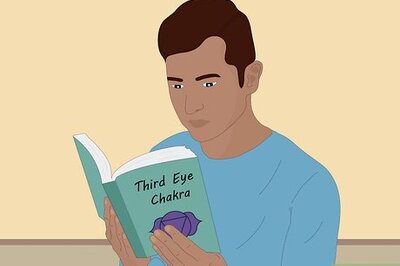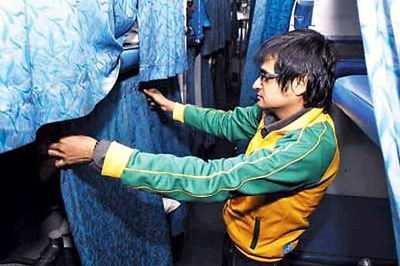
views
Kolkata: Recently, the Election Commission (EC) sought a reply from the All India Trinamool Congress (AITC), Communist Party of India (CPI) and Nationalist Congress Party (NCP) on why their recognition as a ‘national party’ status should not be withdrawn.
Based on the criteria mentioned in the ‘Election Symbols (Reservation and Allotment) Order, 1968’, the EC lists political parties as a ‘national party’, ‘state party’ or ‘registered (unrecognised) party’.
Due to several political developments over the past few years, the EC wants these political parties to respond on why their ‘national party’ status should not be taken away.
To start with the Mamata Banerjee-led Trinamool Congress, the party managed to win only one of the 60 Assembly seats during the 2017 Manipur Assembly polls and secured 1.4 per cent votes (Tongbram Robindro Singh was declared winner from Thanga).
In Arunachal Pradesh, the party contested the 2009 Assembly elections for the first time and won five of the 60 seats. However, it did not field any candidate in the 2019 Assembly polls.
During the Assam Assembly elections in 2011, the Trinamool Congress contested from 103 seats (out of 126), but won only one — Karimganj South. In 2016, it managed to grab only 4.93 per cent votes (from Hajo) and failed to win any seat. In the 2018 Tripura Assembly polls, the party contested from 24 of the 297 seats, but failed to win any (0.3 per cent vote share).
“Considering these results, the Trinamool Congress fails to fulfil the criteria of ‘national party’ status, because according to the Election Symbols order, a political party can be accorded national status only if its vote share is six per cent in the last Assembly polls in each of any four states along with four seat in the last general polls; or 2% of all Lok Sabha seats in the last such elections with MPs elected from at least three states; or recognition as a state party in at least four states,” said Kapil Thakur, a political expert. At present, the Banerjee-led is not fulfilling any of the above criteria to retain its ‘national party’ status.
The CPI too is unable to meet the criteria in Tamil Nadu, Manipur and West Bengal. In Kerala, it won 19 seats in the 2016 Assembly elections. The party became insignificant in Tamil Nadu and West Bengal as it managed to win only one seat each in 2016. In Manipur, it failed to open its account in the 2017 Assembly polls.
At present, the CPI is far behind the EC’s clause which mandates that “a political party can only be considered as ‘national party’ if its vote share is six per cent in the last Assembly polls in each of any four states.”
“Except Kerala, we are not fulfilling the criteria in rest of the states. Let’s not get into how many seats we won or lose. The point is, as per norms, which was amended in 2016, the EC can review the status of parties every 10 years. The poll body did the first review in 2014 and the next review is scheduled for 2024. I don’t know why has it sent the letters now — five years before the next date,” said CPI secretary Swapan Banerjee.
The NCP is also facing the similar crisis as it failed to meet the criteria of 6 per cent vote share in the last Assembly polls. Party spokesperson Nawab Malik said a reply would be sent based on the Assembly election (scheduled to be held in October or November) results in Maharashtra.
Meanwhile, Meghalaya Chief Minister Conrad Sangma’s National People’s Party (NPP) got the status of a ‘national party’. It became the eighth party (first from the northeast) to be accorded the recognition. The other seven are the Congress, Bharatiya Janata Party (BJP), Bahujan Samaj Party (BSP), NCP, CPI, CPI (M) and AITC.
With its significant presence in Arunachal Pradesh, Manipur and Nagaland, besides Meghalaya, the NPP has satisfied the EC’s last criteria — ‘recognition as a state party in at least four states’.
In 2017, the NPP won four of the 60 Assembly seats in Manipur by securing a vote share of 5.05 per cent, while in 2019, it won five of the 60 Assembly seats in Arunachal Pradesh with a 14.56 per cent.
In 2018, it won 19 (out of 58) and five (out of 60) seats in Meghalaya and Nagaland, in the respective Assembly elections. While the vote share in Meghalaya was 20.60 per cent, in Nagaland it was 6.92 per cent.
Political entities try to get the ‘national party’ status due to the several benefits attached with it, including a single proposer to file nomination and cap on other political parties to use their symbols in any platform.
Recognised national parties and their candidates are given two and one set of electoral rolls, respectively, free of cost by the EC. They are also entitled to get land or building from the government to set up their party offices.
They can also hire up to 40 star campaigners and the expenditure on their travelling and other expenses will be excluded from the election expenditure of the party candidate. They can also get a slot on national television, state television and on radio to address the people and convey their political message to the masses.
Though, the EC has sought reply from these three parties (AITC, NCP and CPI) by August 5, experts believe they will get ample breathing space as the EC had amended its rules in 2016, to review the status of political parties every 10 years instead of five years.



















Comments
0 comment